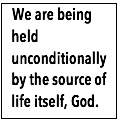|
Several years ago, I was at a symposium at which we were
discussing the struggle that many young people have today
with their faith. One of the participants, a young French
Canadian Oblate, offered this perspective:
I work with university students as a chaplain. They
have a zest for life and an energy and color that I
can only envy. But inside of all this zest and energy,
I notice that they lack hope because they don’t have a
meta-narrative. They don’t have a big story, a big
vision, that can give them perspective beyond the ups
and downs of their everyday lives. When their health,
relationships, and lives are going well, they feel
happy and full of hope; but the reverse is also true.
When things aren’t going well the bottom falls out of
their world. They don’t have anything to give them a
vision beyond the present moment.
In essence, what he is describing might be called
“the peace that this world can give us.” In
his farewell discourse, Jesus contrasts two kinds of
peace: a peace that he leaves us and a peace that the
world can give us. What is the difference?
The peace that the world can give to us is not a negative
or a bad peace. It is real and it is good, but it is
fragile and inadequate.
It is fragile because it can easily be taken away from us.
Peace, as we experience it ordinarily in our lives, is
generally predicated on feeling healthy, loved, and
secure. But all of these are fragile. They can change
radically with one visit to the doctor, with an unexpected
dizzy spell, with sudden chest pains, with the loss of a
job, with the rupture of a relationship, with the suicide
of a loved one, or with multiple kinds of betrayal that
can blindside us. We try mightily to take measures to
guarantee health, security, and the trustworthiness of our
relationships, but we live with a lot of anxiety, knowing
these are always fragile. We live inside an anxious peace.
 As well, the peace we experience in our ordinary lives
never comes to us without a shadow. As Henri Nouwen puts
it, there is a quality of sadness that pervades all the
moments of our life so that even in our most happy moments
there is something missing. In every satisfaction there is
an awareness of limitation. In every success there is fear
of jealousy. In every friendship there is distance. In
every embrace there is loneliness. In this life there is
not such a thing as a clear-cut, pure joy. Every bit of
life is touched by a bit of death. The world can give us
peace, except it never does this perfectly. As well, the peace we experience in our ordinary lives
never comes to us without a shadow. As Henri Nouwen puts
it, there is a quality of sadness that pervades all the
moments of our life so that even in our most happy moments
there is something missing. In every satisfaction there is
an awareness of limitation. In every success there is fear
of jealousy. In every friendship there is distance. In
every embrace there is loneliness. In this life there is
not such a thing as a clear-cut, pure joy. Every bit of
life is touched by a bit of death. The world can give us
peace, except it never does this perfectly.
What Jesus offers is a peace that is not fragile, that is
already beyond fear and anxiety, that does not depend upon
feeling healthy, secure, and loved in this world. What is
this peace?
At the last supper and as he was dying, Jesus offered us
his gift of peace. And what is this? It is the absolute
assurance the we are connected to the source of life in
such a way that nothing, absolutely nothing, can ever
sever—not bad health, not betrayal by someone, indeed, not
even our own sin. We are unconditionally loved and held by
the source of life itself and nothing can change that.
Nothing can change God’s unconditional love for us.
That’s the meta-narrative we need in order to keep
perspective during the ups and downs of our lives. We are
like actors in a play. The ending of the story has already
been written and it is a happy one. We know that we will
triumph in the end, just as we know that we will have some
rocky scenes before that ending. If we keep that in mind,
we can more patiently bear the seeming death-dealing
tragedies that befall us. We are being held
unconditionally by the source of life itself, God.
If that is true, and it is, then we have an assurance of
life, wholeness, and happiness beyond the loss of youth,
the loss of health, the loss of reputation, the betrayal
of friends, the suicide of a loved one, and even beyond
our own sin and betrayals. In the end, as Julian of
Norwich says, all will be well, and all will be well, and
every manner of being will be well.
And we need this assurance. We live with constant anxiety
because we sense that our health, security, and
relationships are fragile, that our peace can easily
disappear. We live too with regrets about our own sins and
betrayals. And we live with more than a little uneasiness
about broken relationships and loved ones broken by
bitterness or suicide.
Our peace is fragile and anxious. We need to more deeply own
Jesus’ farewell gift to us: I leave you a peace that
no one can take from you: Know that you are loved and held
unconditionally.
Ron Rolheiser
|